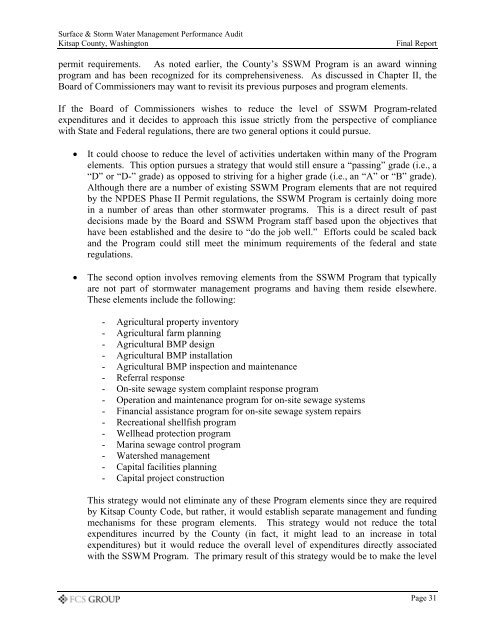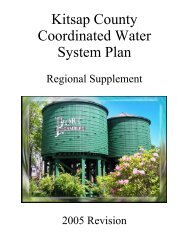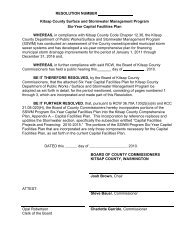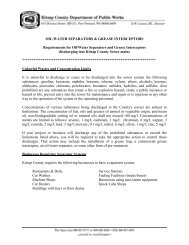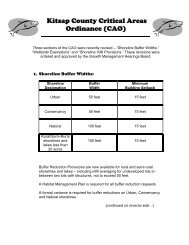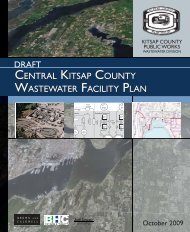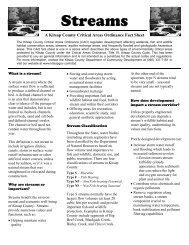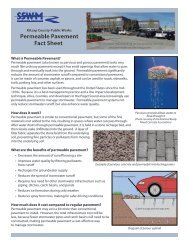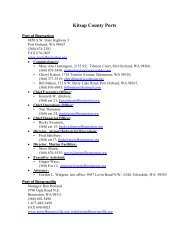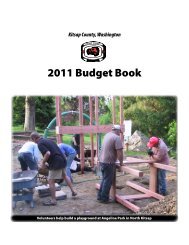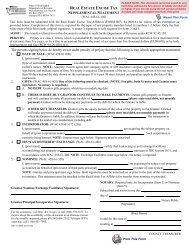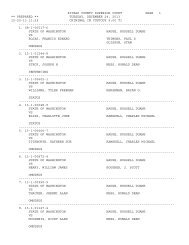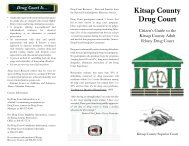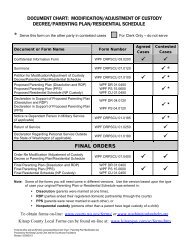surface & stormwater management performance audit final report
surface & stormwater management performance audit final report
surface & stormwater management performance audit final report
Create successful ePaper yourself
Turn your PDF publications into a flip-book with our unique Google optimized e-Paper software.
Surface & Storm Water Management Performance Audit<br />
Kitsap County, Washington<br />
Final Report<br />
permit requirements. As noted earlier, the County’s SSWM Program is an award winning<br />
program and has been recognized for its comprehensiveness. As discussed in Chapter II, the<br />
Board of Commissioners may want to revisit its previous purposes and program elements.<br />
If the Board of Commissioners wishes to reduce the level of SSWM Program-related<br />
expenditures and it decides to approach this issue strictly from the perspective of compliance<br />
with State and Federal regulations, there are two general options it could pursue.<br />
• It could choose to reduce the level of activities undertaken within many of the Program<br />
elements. This option pursues a strategy that would still ensure a “passing” grade (i.e., a<br />
“D” or “D-” grade) as opposed to striving for a higher grade (i.e., an “A” or “B” grade).<br />
Although there are a number of existing SSWM Program elements that are not required<br />
by the NPDES Phase II Permit regulations, the SSWM Program is certainly doing more<br />
in a number of areas than other <strong>stormwater</strong> programs. This is a direct result of past<br />
decisions made by the Board and SSWM Program staff based upon the objectives that<br />
have been established and the desire to “do the job well.” Efforts could be scaled back<br />
and the Program could still meet the minimum requirements of the federal and state<br />
regulations.<br />
• The second option involves removing elements from the SSWM Program that typically<br />
are not part of <strong>stormwater</strong> <strong>management</strong> programs and having them reside elsewhere.<br />
These elements include the following:<br />
- Agricultural property inventory<br />
- Agricultural farm planning<br />
- Agricultural BMP design<br />
- Agricultural BMP installation<br />
- Agricultural BMP inspection and maintenance<br />
- Referral response<br />
- On-site sewage system complaint response program<br />
- Operation and maintenance program for on-site sewage systems<br />
- Financial assistance program for on-site sewage system repairs<br />
- Recreational shellfish program<br />
- Wellhead protection program<br />
- Marina sewage control program<br />
- Watershed <strong>management</strong><br />
- Capital facilities planning<br />
- Capital project construction<br />
This strategy would not eliminate any of these Program elements since they are required<br />
by Kitsap County Code, but rather, it would establish separate <strong>management</strong> and funding<br />
mechanisms for these program elements. This strategy would not reduce the total<br />
expenditures incurred by the County (in fact, it might lead to an increase in total<br />
expenditures) but it would reduce the overall level of expenditures directly associated<br />
with the SSWM Program. The primary result of this strategy would be to make the level<br />
Page 31


